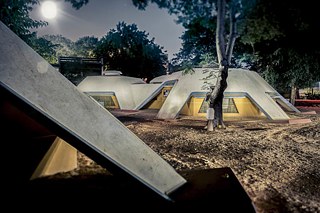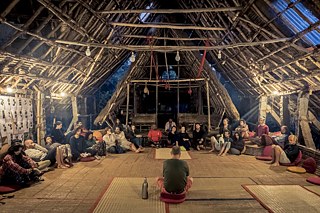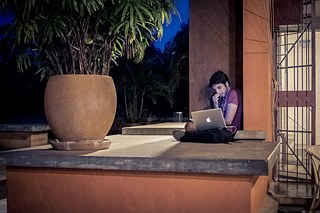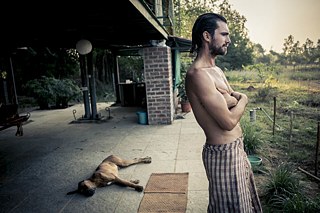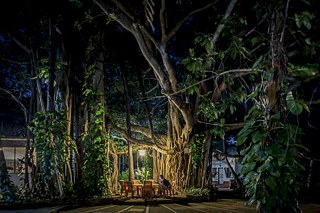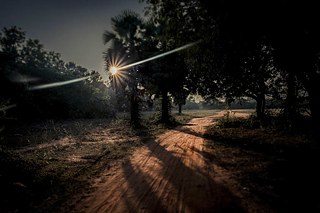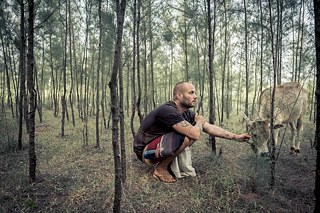50 years of Auroville
A city without property, money and government

A ‘human laboratory’ – this was what the township of Auroville, founded 50 years ago, was supposed to be: basic income for all, no hierarchies, all decisions based on consensus. Frederick Schulze-Buxloh has been there from the very start.
By Gerhard Richter / Photos by David Klammer
Frederick has just breakfasted on a scrambled egg in the cafe and is going back to his house. He is tall, slim. An almost aristocratic bearing. Short grey hair, he looks fondly at his life’s work.
In the pioneering days we would spend 95 per cent of our time surviving, getting water, getting electricity, getting bread, finding accommodation, having transport, you had virtually no time to contribute in some way to developing the town.“
It was fully furnished, I mean a handful of things are my own, and when I open the door I think: thank you, thank you!“
Gratitude is a precious feeling
Frederick believes that gratitude is far more precious than having a lot of money and being able to afford everything. Once upon a time he was rich, very rich in fact, he would have been able to afford a couple dozen such houses.Frederick’s father makes a fortune in mining. The family ends up in Munich after the war. But post-war Germany offers the young sophisticate no direction.
Denazification had been initiated by the Americans and as children we were sent every month at least once to Dachau to see all that happened there. And of course that had an impact.“
To fill the inner vacuum, he reads eastern philosophers such as Sri Aurobindo. He is drawn to the teachings of the gentle scholar and yoga guru that speak of a higher consciousness. After finishing high school in Germany, Frederick travels on a cargo ship from Genoa to Bombay. That was 1959. A year later, he meets Aurobindo personally and lives in his ashram. There he meets Mother Alfassa, Aurobindo’s partner.
...and that changed my life.“
He puts all his money into the shared vision
Mother Alfassa gives Frederick guidance and direction. In return he gives her his entire fortune and devotes his life to serving their shared vision. It’s called Auroville – a town that belongs to nobody, where people from all countries live together, with no property, no money and no government. Frederick puts his heart and soul into the project, founds a family and, at the request of the Mother, builds the first solid house.She just wanted something solid, not only bamboo, but a proper stone house, to show the world that we are here for good. And for the next 20 years those were my marching orders: ‘You must guarantee continuity.“
For lunch, Frederick goes to the solar kitchen, a canteen where 1,000 vegetarian dishes are cooked every day using solar energy. He’s wearing a light shirt, shorts and flip-flops. This is where he meets acquaintances, they exchange news. Like all the others living here, he is given a sort of basic income which is pretty adequate for one’s living expenses. In return, one has to spend four hours a day doing something for the community. Frederick handles the sensitive relations between the Government of India, UNESCO and the Auroville bodies. India’s Ministry of Human Resource Development supports Auroville, gives some money, but has little to say. The Aurovillians maintain a self-governing system based on the consensus principle. An ongoing experiment.
They cannot come and say: ‘That’s the way it will be. We’re taking the decision. Because we then say no, you can’t do that. It’s not your decision, it’s ours.“
What helps people in the future?
Much like a company’s research and development department, the Aurovillians, on their vast grounds, test what can help people in the future. Reforestation, alternative energy, gentle healing techniques, small-scale sewage treatment plants, different types of schools, construction techniques, organic farming, integration and music. And living together in solidarity.How does one live and plan together, how does one resolve conflict? Frederick believes that what takes place on a small scale in Auroville, affects the greater good:
If for instance you can develop a kind of self-governing system on a small scale, in which each individual counts and has a say without being judged, then it definitely means something on a larger scale too. The whole world is looking for a really meaningful self-governing system.“
For his Auroville project, photographer David Klammer made several trips to the utopian village, spending a total of three months there. He met many people who were eager to talk and open to discussion. The photos are published in the coffe-table book Good morning Auroville: Die utopische Stadt der Morgendämmerung (Edition Bildperlen).
David Klammer lives in Cologne, Germany. He has won numerous prestigious awards, including an award for the 2007 World Press Photo contest. His work on the activists at the Hambacher Forst was awarded with the First Price for the best series in the contest for political photography "Rückblende 2018". Besides working on commissions, Klammer also works on personal long-term projects.

